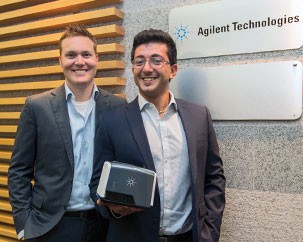After each of their three work terms, students are required to meet in small groups to reflect on what they’ve absorbed. Some of the positive learning experiences exceeded even Hughes’s expectations. “We placed a student at Pratt & Whitney, where he helped supervise 110 unionized employees,” he recalls. “When I asked him what makes a good supervisor, he spoke about the importance of respecting the staff, getting your hands dirty, doing what you say and showing that you care. It was invaluable knowledge, learned on the job.”
The Co-op experience, then, is more than just the job opportunities. It’s about processing each experience and mining it for patterns of best practices and student growth.
“We are working to establish a Co-op wow factor,” says Hughes. “The idea is to give students the training and the preparation that boost confidence.” On the other side of the coin, companies who take on a Co-op student can reduce recruitment expenses, tackle special projects, meet peak workloads, evaluate potential full-time hires, engage in joint research projects with the faculty and get first pick at the top talent — all while enjoying tax breaks.
Wow, indeed. With almost $10,000 in Co-op scholarships awarded through the program to worthy students last year, word is growing about this vibrant way for students to bridge university life and the working world.
“The misconception is that we’re simply a placement agency,” clarifies Hughes. “A key part of our branding is the official ‘Co-op experience,’ with our professional staff, value-added resources, services and seminars that go above and beyond the practical work experience students gain in their fields. It’s the definition of win-win.”
When it comes to discovering their niche in the field — be it accounting, biochemistry, mechanical engineering or any of the 39 available programs — students in Co-op are one step ahead. Maybe they excel at strategy or client development. Maybe they thrive in a research lab or rise to the challenge of project management. Co-op students begin their critical process of self-discovery earlier and obtain a “head start” on establishing their career journey.
Hughes, who helms a team of 16 staff at Co-op, explains, “Our goal is to enable students to develop the knowledge, skills and experience they need to lead successful professional lives.”
- For more information, visit concordia.ca/co-op.
—Joanne Latimer, MFA 94, is a Montreal-based freelance writer.
 Concordia co-op director Gerry Hughes, seated, and (from left) co-op coordinators Alex Bottausci, Fred Francis, Richard Melkonian and Jane Fairhurst, who work to help place students with employers.
Concordia co-op director Gerry Hughes, seated, and (from left) co-op coordinators Alex Bottausci, Fred Francis, Richard Melkonian and Jane Fairhurst, who work to help place students with employers.




